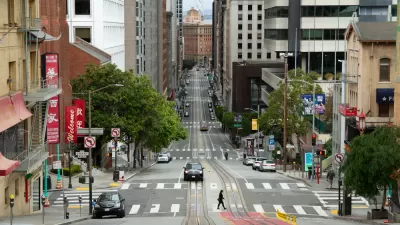The most recent Census data on migration shows the continuation of a decades-long decline in migration in the United States, according to analysis by William H. Frey.

The U.S. Census Bureau released a fresh batch of Current Population Survey Annual Social and Economic Supplement data, bringing the data current to the pandemic's doorstep. William H. Frey provides insight and analysis from the data dump, noting that the continuing trend of declining migration is likely to change in 2020—but there are no Census data to show those changes yet.
Still, newly released pre-pandemic census statistics show a continuation of the decades-long migration decline, bringing the percentage of Americans who changed residence to a post-World War II low of 9.3%. This one-year rate—between March 2019 and March 2020—occurred on the heels of a year when the nation’s total population growth fell to a 100-year low, with a continued downturn in the nation’s foreign-born population gains. Thus, even before the pandemic, the nation was in the throes of stagnating demographic dynamics.
The article provides a history of migration in the United States since the mid-20 century, bringing that history up to date with the Millennial Generation. According to Frey, the nation's largest and most diverse generation ever is stuck in place, relative to previous generations.
Frey concludes the article by providing a bit of insight about what data is available to capture the migration trend of Americans during the pandemic, with the caveat that most information needed to understand pandemic migration is still unknow.
FULL STORY: Just before COVID-19, American migration hit a 73-year low

Alabama: Trump Terminates Settlements for Black Communities Harmed By Raw Sewage
Trump deemed the landmark civil rights agreement “illegal DEI and environmental justice policy.”

Study: Maui’s Plan to Convert Vacation Rentals to Long-Term Housing Could Cause Nearly $1 Billion Economic Loss
The plan would reduce visitor accommodation by 25% resulting in 1,900 jobs lost.

Planetizen Federal Action Tracker
A weekly monitor of how Trump’s orders and actions are impacting planners and planning in America.

Waymo Gets Permission to Map SF’s Market Street
If allowed to operate on the traffic-restricted street, Waymo’s autonomous taxis would have a leg up over ride-hailing competitors — and counter the city’s efforts to grow bike and pedestrian on the thoroughfare.

Parklet Symposium Highlights the Success of Shared Spaces
Parklets got a boost during the Covid-19 pandemic, when the concept was translated to outdoor dining programs that offered restaurants a lifeline during the shutdown.

Federal Homelessness Agency Places Entire Staff on Leave
The U.S. Interagency Council on Homelessness is the only federal agency dedicated to preventing and ending homelessness.
Urban Design for Planners 1: Software Tools
This six-course series explores essential urban design concepts using open source software and equips planners with the tools they need to participate fully in the urban design process.
Planning for Universal Design
Learn the tools for implementing Universal Design in planning regulations.
Caltrans
Smith Gee Studio
Institute for Housing and Urban Development Studies (IHS)
City of Grandview
Harvard GSD Executive Education
Toledo-Lucas County Plan Commissions
Salt Lake City
NYU Wagner Graduate School of Public Service





























